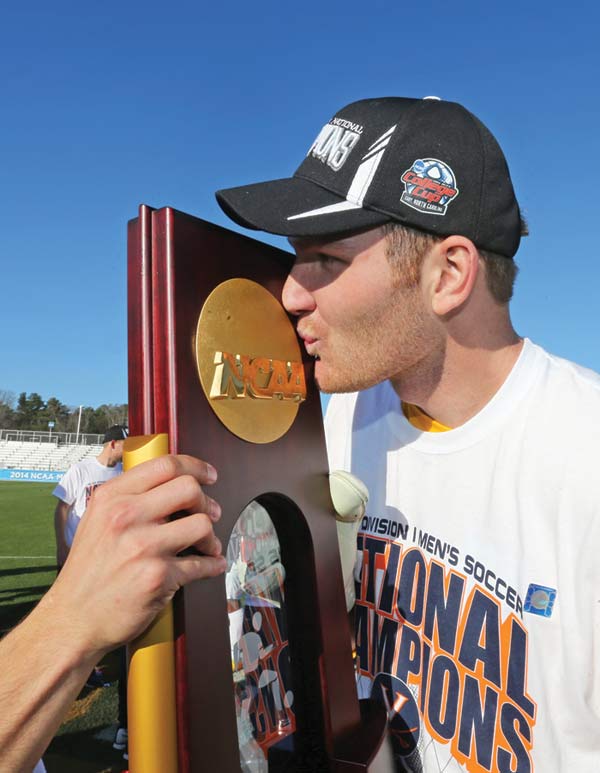We Are the Champions
UVA men’s soccer wins seventh NCAA tournament
After coming off a College Cup semifinals loss last year, the early outlook for the men’s soccer team to return to the Final Four this past season was strong.
But in January 2014, star midfielder Jordan Allen left UVA to play professionally. Over the summer, midfielder Marcus Salandy-Defour suffered a season-ending ACL injury. And on the third day of preseason play, forward Darius Madison sprained his ankle, taking him out of competition for five weeks.
“Those three guys made up a dynamic quality to our team,” says Cavalier head coach George Gelnovatch, now in his 19th season at UVA. “You could maybe do without one, two would be tough and three was putting us in a really difficult place. My sense was, to get back to the College Cup with those losses, we’d have to work hard and figure out a different way to do it.”
It took a few regular-season losses and strategic changes, but the Cavaliers persevered, making their 34th consecutive NCAA tournament appearance—the longest current streak in Division I history—and winning the national title against UCLA in dramatic fashion.

Last year’s Cavaliers were prolific scorers, totaling 45 goals. This year’s squad started out trying to play the same way but found that the results weren’t the same.
“Throughout the season, we struggled to score, and those key injuries obviously played a role,” fourth-year goalkeeper Calle Brown says. Third-year midfielder Todd Wharton added, “We were too focused on being like last year’s team, being dangerous scoring goals.”
UVA finished the regular season with 21 goals and a 9-5-2 record, seeded eighth heading into the ACC tournament. They fell 3-0 to Notre Dame in the quarterfinals, earning a No. 16 seed for the NCAA tournament.
With two weeks to practice before the tournament began, the team refocused. “During that break, as one of our coaches said, we found out who we are,” Wharton says. “We knew that to win, we’d have to play the best defense and catch a team on the break.”
The team also shifted its formation.
“Sometimes when you try too hard, committing a lot of the team into the attack, you get exposed defensively, so we pulled the reins back a bit,” Gelnovatch says. “By playoff time, we decided we’d be very good defensively, not let you score, and be very calculated in how we attack.”
After defeating UNCW 3-1, Virginia traveled to Notre Dame, the tournament’s top seed. They beat the Fighting Irish 1-0, and then won a 5-4 penalty shootout against Georgetown to advance to the College Cup, where their defense led them to a 1-0 semifinal victory over UMBC.
In the title game, Virginia faced UCLA, a team of sensational scorers. With a 0-0 score at the end of regulation, they moved to a penalty shootout.
The Cavaliers found the net in a 4-2 advantage, winning the seventh national title in program history. With their 16-seed ranking, UVA matched the second-lowest seed to win a championship since the NCAA started seeding 16 teams in 2003 (unseeded UC Santa Barbara won the title in 2006).
“Clearly we were a good team—you can’t win a national championship and not have talent,” Gelnovatch says. “But one of the special things about this team is how, together, we figured out what we needed to do to be at our best and we implemented it.”
